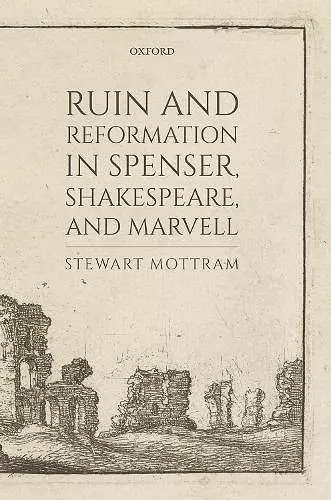Ruin and Reformation in Spenser, Shakespeare, and Marvell
Format:Hardback
Publisher:Oxford University Press
Published:5th Mar '19
Currently unavailable, and unfortunately no date known when it will be back

Ruin and Reformation in Spenser, Shakespeare, and Marvell explores writerly responses to the religious violence of the long reformation in England and Wales, spanning over a century of literature and history, from the establishment of the national church under Henry VIII (1534), to its disestablishment under Oliver Cromwell (1653). It focuses on representations of ruined churches, monasteries, and cathedrals in the works of a range of English Protestant writers, including Spenser, Shakespeare, Jonson, Herbert, Denham, and Marvell, reading literature alongside episodes in English reformation history: from the dissolution of the monasteries and the destruction of church icons and images, to the puritan reforms of the 1640s. The study departs from previous responses to literature's 'bare ruined choirs', which tend to read writerly ambivalence towards the dissolution of the monasteries as evidence of traditionalist, catholic, or Laudian nostalgia for the pre-reformation church. Instead, Ruin and Reformation shows how English protestants of all varieties—from Laudians to Presbyterians—could, and did, feel ambivalence towards, and anxiety about, the violence that accompanied the dissolution of the monasteries and other acts of protestant reform. The study therefore demonstrates that writerly misgivings about ruin and reformation need not necessarily signal an author's opposition to England's reformation project. In so doing, Ruin and Reformation makes an important contribution to cross-disciplinary debates about the character of English Protestantism in its formative century, revealing that doubts about religious destruction were as much a part of the experience of English protestantism as expressions of popular support for iconoclasm in the sixteenth and seventeenth centuries.
This book has much to tell historians and literary scholars about the complexity of attitudes towards iconoclasm and religious violence in the long reformation. Its learning is deep, its moves carefully meditated, and its resolve to wayfare across artificial period boundaries a welcome prompt to students of early modern cultural history. * Matthew Augustine, The Seventeenth Century *
a crucial interlocutor for any serious scholar or student of Milton's writing. * Andrew Wadoski, Milton Quarterly *
Stewart Mottram's engaging new book...is a well-researched book which...offers a valuable contribution to scholarship representative of the so-called religious 'turn' of English early modern studies...This book will also productively complement ongoing scholarship on antiquarianism and its uses in Tudor and StuartEngland and Wales. * Matthew Woodcock, University of East Anglia, Review of English Studies *
The broader issues raised by this book...and, indeed, the attention paid to Wales is a welcome contribution to a literature that has hitherto focused on England. * Harriet Lyon, University of Cambridge, English Historical Review *
adds to a growing literature on ruined buildings and iconoclasm during England's Long Reformation ... Mottram reads canonical literature alongside lesser-known texts, examining their depictions of literal and figurative ruins. * Alex Garganigo, Journal of British Studies *
This book has much to tell historians and literary scholars about the complexity of attitudes towards iconoclasm and religious violence in the long reformation. Its learning is deep, its moves carefully meditated * Matthew C. Augustine, University of St Andrews, The Seventeenth Century *
There are few literary critics today who have his deep reservoir of knowledge in the literary, political and religious history of the period. An empiricist at heart, his command of primary texts in manuscript and print is masterful and knowledge of secondary scholarship impressive. * Andrew Hui, The Spenser Review *
ISBN: 9780198836384
Dimensions: 240mm x 164mm x 22mm
Weight: 560g
272 pages